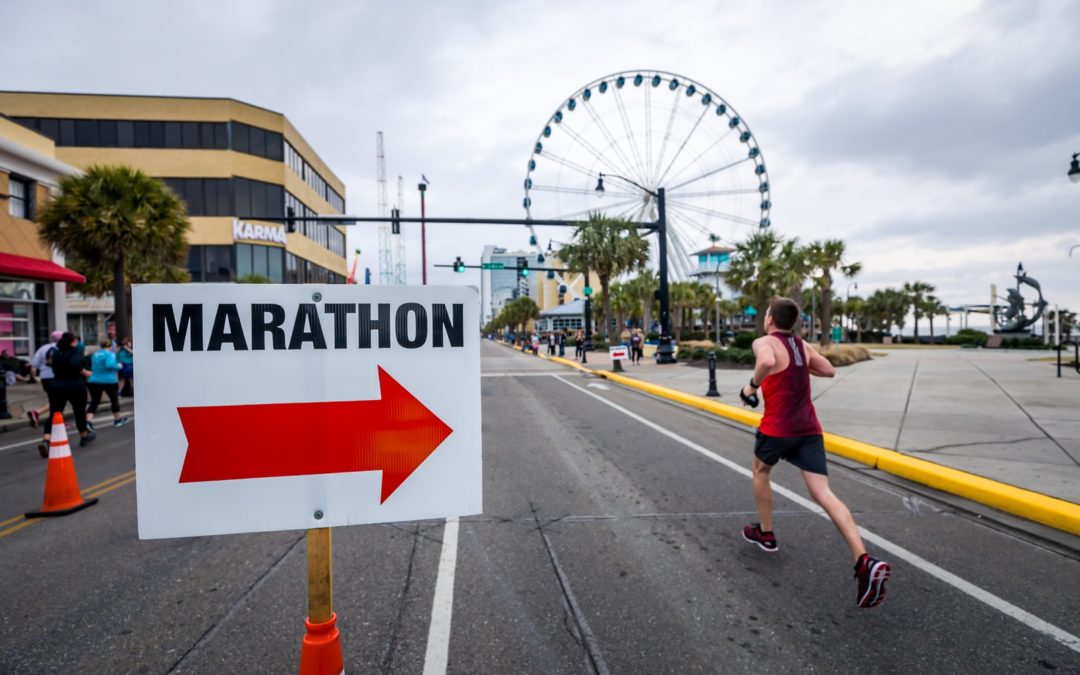BY: Kelsey Hampton MS, CSSD, RDN, LD from Sports Dietitian at Nutriworks, Inc.
What you eat the morning of, and day before your race can have a major impact on your digestion, and, ultimately, your race performance. While some may have tried and true meals they stick with before racing, others may take a more relaxed approach and enjoy what sounds good in the moment or they can easily put together. We all tolerate foods differently, and some may experience more of a nervous stomach than others come race morning, but even with these variables, there are a few points to keep in mind when choose meals before your big race.
- Timing is one of the biggest mistakes made when it comes to fueling a race. Even the simplest to digest foods can wreak havoc on your digestive tract if consumed too close to your event, especially if in the wrong amounts. Your pre-race breakfast should be about 2.5-3 hours prior to when you plan to start the race. From there, back up another 10-12 hours and that is when dinner should be the night before. This may be an earlier dinner than you are used to, but doing so will allow plenty of time for digestion and will ensure you have an appetite to eat your full pre-race breakfast.
- Food choices play another major role in preparing you for your race. While BBQ, pizza and burgers may be foods you can’t wait to splurge on after the race, you should stay far from these high fat meals ahead of time. Dinner the night before and breakfast the morning of should be carb-dense and fairly low in protein and fat to allow for ease of digestion, and to help top-off carb stores in your body. At dinner the night before, skip fatty pieces of meat, like beef and sausage, all fried foods, heavy creamy sauces, like alfredo, and excessively spicy foods. Similarly, your pre-race breakfast should limit fatty meat, like bacon and sausage. Keep reading to find examples of dinner and breakfast meals for your next race!
- The portion size you consume will have a big impact on digestion. Many people assume the more carbs, the better before a race, and this mindset can actually cause some digestive issues. While carbs are the primary source of fuel your body will use while racing, there is such a thing as overdoing it. Your dinner and breakfast meals should be mostly focused around carb sources, like pasta, potato, rice, oatmeal, fruit and bread; however, don’t feel the need to eat these foods in excessive amounts. The amount of carb required for proper fueling is different for everyone, and one of our dietitians can help determine this for you in a 1:1 consultation, but most people don’t need to drown themselves in all-you-can-eat pasta the night before a race. For most people, dinner and breakfast before a race should contain 3-4 servings of a carb-dense food. This is likely to take up about half to two thirds of your plate or be about the size of 1.5-2 of your fists, for reference.
- Proper hydration is key to race performance, and often an area of nutrition many struggle with. The week leading into a race, ensure you are drinking adequate fluid. Females should aim for at least 80oz of total fluid per day, at least half coming from water, while men should shoot for a minimum of 110oz per day. These numbers should serve as a baseline, and all athletes should be consuming additional fluid during training sessions to make up for sweat losses. One mistake many athletes make before a race is drastically over consuming water the day before, and morning of their race. While this can help with hydration, it can majorly imbalance electrolytes, like sodium and potassium, and negatively impact performance. Most people will likely consume adequate amounts of electrolytes from the foods they eat; however, for those who are heavy sweaters and/or live in hot and humid environments, it may be best to add some extra salt to your food the day before your race and add a serving or two of an electrolyte supplement to your water to ensure these nutrients stay in balance.
With these guidelines, you should be well on your way to a well-fueled race! If you are stumped on how to put your dinner and breakfast meals together, take a look at our suggestions below, and if you are looking for more individualized information specific to your goals and needs, reach out to Nutriworks, Inc. to learn more about our consultation services.
Dinner:
Pasta with marinara sauce and shrimp; a piece of bread (sorry, no cheesy garlic bread) and side salad.
Stir fry with rice, fresh or frozen veggies of choice, soy or teriyaki sauce, and a lean protein, like chicken, fish, shrimp or tofu, no larger than the size of your palm.
Large baked potato or sweet potato topped with seasoning of choice; no more than a palm size portion of lean protein, and lightly roasted or sautéed veggies.
Pre-race breakfast:
Oatmeal made with water and topped with fruit or dried fruit and a drizzle of honey; side of toast with a light spread of peanut butter
Bagel with a light spread of cream cheese or peanut butter; 1 banana
1 Clif bar with a serving of nonfat flavored yogurt topped with fruit
